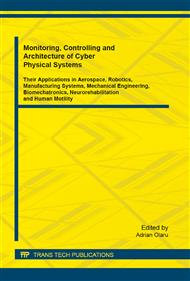[1]
I. Utkin and H. C. Chang, Sliding mode control on electromechanical systems, Mathematical Problems in Engineering. 8 (2002), 451-471.
Google Scholar
[2]
Kawamura, H. Itoh and K. Sakamoto, Chattering reduction of disturbance observer based sliding mode control, IEEE Transactions on Industry Applications. 30 (1992), 456-461.
DOI: 10.1109/28.287509
Google Scholar
[3]
H. F. Ho, Y. K. Wong and A. B. Rad, Adaptive fuzzy sliding mode control with chattering elimination for nonlinear SISO systems, Simulation Modeling Practice and Theory. 17(2009), 1199-1210.
DOI: 10.1016/j.simpat.2009.04.004
Google Scholar
[4]
G. Bartolini, A. Ferrara, E. Usai and V. I. Utkin, On multi-input chattering free second order sliding mode control, IEEE Transactions on Automatic Control. 45(2000), 1711–1717.
DOI: 10.1109/9.880629
Google Scholar
[5]
G. Bartolini, A. Ferrara and E. Usai, Chattering avoidance by second order sliding mode control, IEEE Transactions on Automatic Control. 43(1998), 241–246.
DOI: 10.1109/9.661074
Google Scholar
[6]
S. Seshagiri and H. K. Khalil, Robust output feedback regulation of minimum phase nonlinear systems using conditional integrator, Automatica. 41(2005), 43-54.
DOI: 10.1016/s0005-1098(04)00248-1
Google Scholar
[7]
B. K. Yoo, and W. C. Ham, Adaptive control of robot manipulators using fuzzy compensator, IEEE Transaction on Fuzzy Systems. 8 (2000), 186-199.
DOI: 10.1109/91.842152
Google Scholar
[8]
Y. Pan, M. J. Er, D. Haung and Q. Wang, Adaptive fuzzy control with guaranteed convergence of optimal approximation error, IEEE Transaction on Fuzzy Systems. 19 (2011), 807-818.
DOI: 10.1109/tfuzz.2011.2144600
Google Scholar
[9]
N. Ullah, S. Wang and J. Aslam, Adaptive robust control of electrical load simulator based on fuzzy logic compensation, International Conference of Fluid Power and Mechatronics. 2011, 17 – 20, Beijing China.
DOI: 10.1109/fpm.2011.6045882
Google Scholar
[10]
R. Chen, L. MI and W. Tan, Adaptive fuzzy logic based sliding mode control of electronic throttle, Journal of Computational Information Systems, 8(2012), 3253-3260.
Google Scholar
[11]
J. Ren and X. Zhang, Compensated tracking errors based adaptive fuzzy controller design for uncertain nonlinear system with minimal parameterization, Journal of Computers. 9(2014), 78-84.
DOI: 10.4304/jcp.9.1.78-84
Google Scholar
[12]
F. Juntao, W. Shitao, H. Shixi and H. Mingang, A new adaptive fuzzy sliding mode controller for trajectory tracking of MEMS triaxial gyroscope, Proceedings of 31st Chinese Control Conference, 2012, 3482-3487.
Google Scholar
[13]
J. Becedas, G. Mamani and V. Feliu, Algebraic parameters identification of DC motors methodology and analysis, International Journal of Systems Science. 41(2010), 1241-1255.
DOI: 10.1080/00207720903244097
Google Scholar
[14]
S. M. Yang and Y. J. Deng, Observer based inertial identification for auto tuning servo motors drive, Industry Applications Conference, 2(2005), 968-972.
DOI: 10.1109/ias.2005.1518467
Google Scholar
[16]
K. Ohnishsi, N. Matsui, and Y. Hori, Estimation, identification and sensorless control in motion control system, Proceedings of the IEEE. 82(1994), 1253-1263.
DOI: 10.1109/5.301687
Google Scholar


